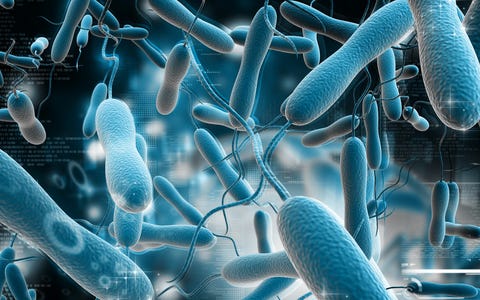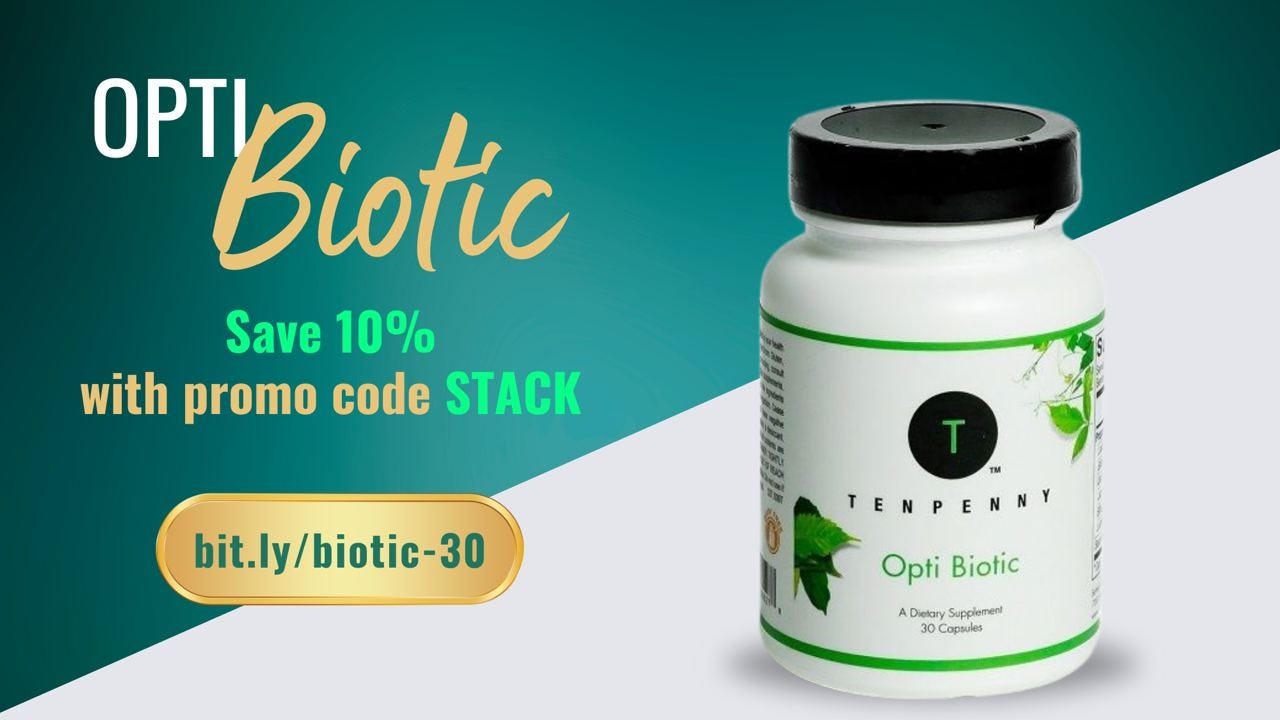Taking Care of Your Microbiomes
Yes, All Three of Them
QUICK LINKS:
Follow: Twitter | Instagram | Telegram | Truth Social | Podcast Membership|
Broadcasts: Rumble| HappyHour |This Wk wDrT | Brighteon | Bitchute | Tues Coffee
Learn about ECP: Health Center Cleveland, OH | Health Center Ventura, CA
Websites: DrTenpenny.com |Tenpenny Apparel| Tenpenny Supplements
Gut Microbiome
A biome is a distinct ecosystem characterized by its environment and its inhabitants. The gut — defined as inside the intestines, from the mouth to the anus — is a miniature biome populated by trillions of microorganisms, including more than a thousand different species of bacteria, as well as fungi and parasites that have a symbiotic relationship with their human. Your gut microbiome is unique to you.
The human gut microbiome plays a key role in both health and disease. It has been the subject of extensive research, establishing its involvement in metabolism, nutrition, physiology, and immune function.
It has been said that the number of bacteria living symbiotically within our gastrointestinal tract (GI) outnumber the total number of cells in our body by a factor of 10 and the number of genes encoded by all those bacteria outnumber our genes by more than 100 times. That’s a lot of critters to take of!
Gut-Skin Axis
Humans have three known biomes. The most well-known and talked about is the gut microbiome. Your gut microorganisms live harmoniously together. They influence many aspects of your overall health, both within and outside your digestive system. The gut microbiome is the largest endocrine organ, producing at least 30 hormone-like compounds and neurotransmitters, such as gamma-aminobutyric acid (GABA), serotonin, dopamine, and tryptophan.
The skin is its own microbiome, containing its own unique set of microbes. As the largest organ of the human body, the skin is colonized by beneficial microorganisms and serves as a physical barrier to prevent the invasion of pathogens. In fact, the skin is home to millions of bacteria, fungi, protozoa, and other pathogens that work to keep skin healthy and protected.
The skin microbiome has gained significant attention in recent years. Much study has been done trying to determine if a disruption of the skin microbiome is the cause or the consequence of a skin disorder. Diet can have a vital role in particular skin pathologies. Foods with trans-fats, refined sugar, unfermented soy, food additives, and genetically engineered (BE) ingredients impair the intestinal barrier, causing a leaky gut, and allowing gut bacteria to enter the bloodstream, leading to massive inflammation.
Numerous studies have found evidence for a profound bidirectional link between the gut and the skin. This occurs through modification of the immune system. For example, gluten can have a negative impact on skin health. Celiac disease and gluten sensitivity have been linked with several skin conditions, especially dermatitis herpetiformis. Patients can clear up this skin rash by shifting to a gluten-free diet.
Here are several common conditions (reference) that show a connection between a disrupted gut microbiome manifesting as a skin disorder and some common solutions:
Acne: Decades ago (1961), a connection between the gut microbiome and acne was suggested using oral Lactobacillus supplements to help the skin flora. While the gut microbiome is only one of many factors contributing to acne, it has an undeniable impact on the skin condition in acne vulgaris. Take out refined sugar, trans-fat, any known allergens, and add a high-yield probiotic. For acne, be sure to treat the gut, not just the skin.
Psoriasis: This condition is characterized by red, scaly, and thickened skin lesions that can occur at any site of the body. It is a multifactorial disease with an interplay between genetic susceptibility, lifestyle (diet), and environmental exposures (soaps, chemicals). People with psoriasis have an increased risk of developing intestinal immune disorders, such as irritable bowel disease (IBD), ulcerative colitis (UC), and celiac disease. Lactose intolerance is significantly more present in psoriasis and is even associated with the severity of its manifestation. Lifestyle has major implications in psoriasis, so eliminating smoking, limiting or stopping alcohol consumption, and getting closer to an ideal body weight can all lead to profound improvements in the skin. Intermittent fasting has positively impacted moderate-to-severe psoriasis. Targeting the gut with probiotics has been especially beneficial to prevent relapses.
Note: It has been my clinical experience that almost every person with psoriasis I have treated over the years had a significant corn intolerance. Be sure to include corn starch, corn oil, corn meal, corn flour, and high-fructose corn syrup, not just kernelled corn, if trying to eliminate corn from your diet.
Rosacea: This is a chronic inflammatory condition of the face. Although the underlying causes of rosacea remain unclear, neurovascular dysregulation, impaired immunity, environmental exposures, hygiene issues (such as perfumed shampoos, lotions, and cosmetics), ethnicity, and genetics have all been suggested to play important roles.
A link between gut dysbiosis and rosacea has been seen because there is an increased risk of gastrointestinal disorders in rosacea patients, especially infections of H. pylori infection, a bacteria that can also cause stomach ulcers. The prevalence of small intestinal bacterial overgrowth (SIBO) is increased in rosacea patients. Treating and eliminating both of these imbalances has resulted in significant improvement of the skin. Based on these reports, the microbiome is a critical therapeutic target.
Alopecia areata: This is a skin condition clinically characterized by small areas of hair loss on the scalp and/or all over the body. A nutrient deficiency can impact hair growth and structure. Deficiencies in iron (low ferritin), zinc, niacin, vitamin D, and vitamin A have all been associated with alopecia areata. Removing gluten and soy from the diet have also shown promise for improvement.
Add the Brain
Historically, the brain has been considered to be a sterile environment, largely protected by the blood-brain barrier. In 2018, a group of scientists from Alabama presented data suggesting the presence of bacteria in the brain tissue of healthy people and that the majority of the bacteria were of three types commonly found in the gut.
This has been referred to as the brain microbiome and has been studied since about 2009. Substances made by bacteria in the gut can get into the blood, just like nutrients in our food travel from the gut into the blood. Also, bacteria in the gut can send signals through nerves that connect the gut to the brain.
Called the gut-brain axis, the third microbiome in your body, consists of bidirectional communication between the brain and the gut, linking the emotional and cognitive centers of the brain with intestinal functions.
Have you ever been stressed by a situation, such as giving a speech before a large audience, and suddenly gotten sick to your stomach or had diarrhea? The connection is real, and it’s more than just an emotional reaction. The interaction between the microbiome in the gut and the activities in the brain appears to be bidirectional, meaning the gut can signal the brain, and the brain can signal the gut. The responses occur through nerves, by hormones, or via the immune system.
There have been hundreds of studies looking at various psychiatric and brain disorders and linking them with the gut microbiome. In the last decade, the gut-skin-brain axis has emerged as a research field offering more and more evidence on the way foods and intestinal microbiota can affect the development of intestinal/skin diseases and neurological-psychiatric-psychological disorders. Research in the past decade has found that gut bacteria may influence our mood (depression/anxiety) and cognitive capabilities.
What you can do:
Digestive enzymes help to break down all types of food for easier digestion. I take Opti-Digestive support with every meal. I’ve tried many; this is my favorite.
Probiotics add an additional layer of help to our gut microbiome and replenish the bacteria damaged or killed by food, alcohol, caffeine, and food additives. I’ve taken Opti-Biotic for years - one at bedtime, which is the ideal time to take your probiotics. This comes in 30 or 60 capsule sizes.
Gluco-control, an all-natural supplement that curbs cravings and balances blood sugar, can lessen the spikes and dips that result in cravings and out-of-control eating. One of my favorites from Touchstone. I really does everything it claims is can do. I take mine around 1p every day to stop the “munchies” after dinner. Gluco-Control helps you feel full longer, supports metabolic function, and supports and nourishes the gut microbiome, which will, in turn, be healthier for your skin and brain biomes!!








For acne, healthy gut for sure but also Burdock Root Tisane is very good. I had acne when I was a teenager and tried a lot of stuffs and nothing was working until I started drinking Burdock Root Tisane. My feeling is what cause acne is a parasite and burdock neutralize it.
Don’t forget: to help the gut biome, add a variety different cultured foods and drinks to your diet. (kefir, kombucha,sauerkraut, pickles, natto, kimchi, etc). An easy, tasty, and bioavailable way to improve/heal your gut.
Check out culturedfoodlife.com for great info!